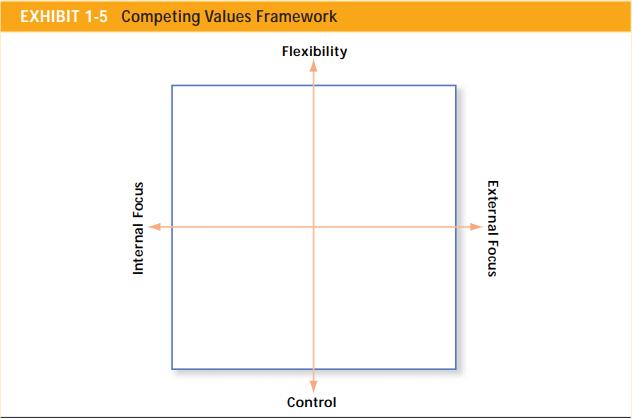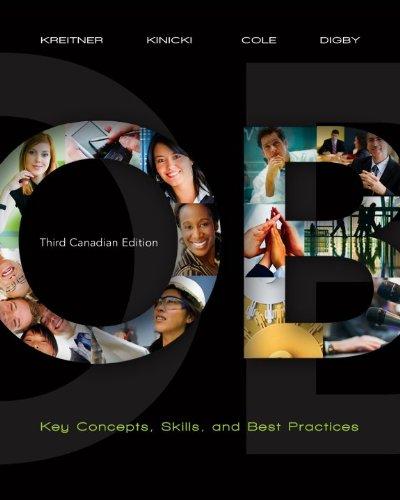We note in the chapter that having a broad range of interpersonal skills to draw on makes
Question:
We note in the chapter that having a broad range of interpersonal skills to draw on makes us more effective organizational participants. So what kinds of interpersonal skills does an individual need in today’s workplace? Robert Quinn, Kim Cameron, and their colleagues have developed a model known as the “Competing Values Framework” that can help us identify some of the most useful skills.40 They note that the range of issues organizations face can be divided along two dimensions: an internal-external and a flexibility-control focus. This is illustrated in Exhibit 1-5. The internal-external dimension refers to the extent that organizations focus on one of two directions: either inwardly, toward employee needs and concerns and/or production processes and internal systems; or outwardly, toward such factors as the marketplace, government regulations, and the changing social, environmental, and technological conditions of the future. The flexibility-control dimension refers to the competing demands of organizations to stay focused on doing what has been done in the past vs. being more flexible in orientation and outlook. Because organizations face the competing demands shown in Exhibit 1-5, it becomes obvious that managers and employees need a variety of skills to help them function within the various quadrants at different points. For instance, the skills needed to operate an efficient assembly-line process are not the same as those needed to scan the environment or to create opportunities in anticipation of changes in the environment. Quinn and his colleagues use the term master manager to indicate that successful managers learn and apply skills that will help them manage across the range of organizational demands; at some times moving toward flexibility, at others moving toward control, sometimes being more internally focused, sometimes being more externally driven.41 As organizations increasingly cut their layers, reducing the number of managers while also relying more on the use of teams in the workplace, the skills of the master manager apply as well to the employee. In other words, considering the Competing Values Framework, we can see that both managers and individual employees need to learn new skills and new ways of interpreting their organizational

contexts. Continuing to use traditional skills and practices that worked in the past is not an option. The growth in self-employment also indicates a need to develop more interpersonal skills, particularly for anyone who goes on to build a business that involves hiring and managing employees.
Questions
1. If you were either a board member or a parent, how would you know that the employees taking care of your children were unhappy with their jobs?
2. What might you do if you learned about their unhappiness?
3. What might Rogers have done differently as president of the board?
4. In what ways does this case illustrate that knowledge of OB can be applied beyond your own workplace?
Step by Step Answer:

Organizational Behaviour Key Concepts Skills And Best Practices
ISBN: 9780070967397
3rd Canadian Edition
Authors: Robert Kreitner, Angelo Kinicki, Nina D. Cole, Victoria Digby, Natasha Koziol





